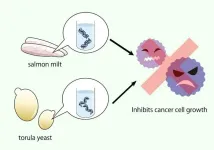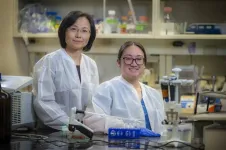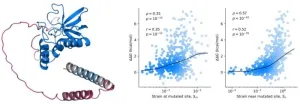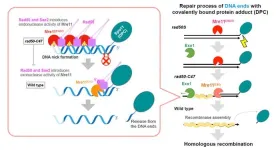(Press-News.org) London, United Kingdom – 29 August 2024: The demands of the working week, often influenced by school or work schedules, can lead to sleep disruption and deprivation. However, new research presented at ESC Congress 2024 shows that people that ‘catch up’ on their sleep by sleeping in at weekends may see their risk of heart disease fall by one-fifth.
“Sufficient compensatory sleep is linked to a lower risk of heart disease,” said study co-author Mr Yanjun Song of the State Key Laboratory of Infectious Disease, Fuwai Hospital, National Centre for Cardiovascular Disease, Beijing, China. “The association becomes even more pronounced among individuals who regularly experience inadequate sleep on weekdays.”
It is well known that people who suffer sleep deprivation ‘sleep in’ on days off to mitigate the effects of sleep deprivation. However, there is a lack of research on whether this compensatory sleep helps heart health.
The authors used data from 90,903 subjects involved in the UK Biobank project, and to evaluate the relationship between compensated weekend sleep and heart disease, sleep data was recorded using accelerometers and grouped by quartiles (divided into four approximately equal groups from most compensated sleep to least). Q1 (n = 22,475 was the least compensated, having -16.05 hours to -0.26 hours (ie, having even less sleep); Q2 (n = 22,901) had -0.26 to +0.45 hours; Q3 (n=22,692) had +0.45 to +1.28 hours, and Q4 (n=22,695) had the most compensatory sleep (1.28 to 16.06 hours).
Sleep deprivation was self-reported, with those self-reporting less than 7 hours sleep per night defined as having sleep deprivation. A total of 19,816 (21.8%) of participants were defined as sleep deprived. The rest of the cohort may have experienced occasional inadequate sleep, but on average, their daily hours of sleep did not meet the criteria for sleep deprivation – the authors recognise this a limitation to their data.
Hospitalisation records and cause of death registry information were used to diagnose various cardiac diseases including ischaemic heart disease (IHD), heart failure (HF), atrial fibrillation (AF), and stroke.
With a median follow-up of almost 14 years, participants in the group with the most compensatory sleep (quartile 4) were 19% less likely to develop heart disease than those with the least (quartile 1). In the subgroup of patients with daily sleep deprivation those with the most compensatory sleep had a 20% lower risk of developing heart disease than those with the least. The analysis did not show any differences between men and women.
Co-author Mr Zechen Liu, also of State Key Laboratory of Infectious Disease, Fuwai Hospital, National Centre for Cardiovascular Disease, Beijing, China, added: “Our results show that for the significant proportion of the population in modern society that suffers from sleep deprivation, those who have the most ‘catch-up’ sleep at weekends have significantly lower rates of heart disease than those with the least.”
ENDS
Notes to editor
Funding: This work was supported by grants from CAMS Innovation Fund for Medical Sciences (No. 2021-I2M-1-008).
Disclosures: The authors declare no conflicts of interest.
References and notes
The abstract “Weekend compensatory sleep is associated with reduced risk of heart disease: a prospective UK Biobank-based cohort study” will be presented at the session ‘Exploring cardiovascular health: lifestyle, economics, and disparities’, which takes place on Sunday 1st September 2024 at Station 8 - Research Gateway.
Previous ESC congresses have produced several previous press releases on the relationship between sleep and heart health.
For some examples, see below
Example 1
Example 2
Example 3
ESC Press Office
Tel: +33 6 61 40 18 84
Email: press@escardio.org
The hashtag for ESC Congress 2024 is #ESCCongress
Follow us on X @ESCardioNews
Journalists are invited to become accredited and register here.
Check out the ESC Media and Embargo Policy.
About ESC Congress 2024
It is the world’s largest gathering of cardiovascular professionals, disseminating ground-breaking science both onsite in London and online – from 30 August to 2 September. Explore the scientific programme. More information is available from the ESC Press Office at press@escardio.org.
About the European Society of Cardiology
The ESC brings together healthcare professionals from more than 150 countries, working to advance cardiovascular medicine and help people to live longer, healthier lives.
END
Catching up on sleep on weekends may lower heart disease risk by up to 20%
2024-08-29
ELSE PRESS RELEASES FROM THIS DATE:
Quitting smoking nearly halves heart attack risk, cutting down does little
2024-08-29
London, United Kingdom – 29 August 2024: According to research presented today at ESC Congress 2024,1 patients with stable coronary artery disease who quit smoking at any timepoint after their diagnosis reduced their risk of a major event by almost 50%. In contrast, there was minimal impact on cardiovascular risk in patients who reduced their smoking habits.
The international CLARIFY registry (prospeCtive observational LongitudinAl RegIstry oF patients with stable coronary arterY ...
Children contribute to group projects when there are clear and common goals
2024-08-29
Children can work together to reach a target that benefits a whole group even if it is at a personal cost to themselves, a new study has shown.
Researchers invited groups of six to 10-year-olds to take part in a game where they were each given containers of water and could decide how much of it to offer into a common pool.
If the group contributed a certain amount of water it resulted in benefits for the whole group, but children also obtained benefits for any water they kept.
At the same time, the ...
Dine on DNA: Compounds from nucleic acids in food show anticancer effects
2024-08-29
When people eat, they ingest the nucleic acids that reside in all living things. The compounds in these acids could inhibit the growth of cancer cells, according to findings published in PLOS ONE by Osaka Metropolitan University Associate Professor Akiko Kojima-Yuasa of the Graduate School of Human Life and Ecology and colleagues.
Consuming nucleic acids found in food has been shown to boost the immune system and prevent some diseases. The nucleotides and nucleosides that result from digesting the acids are largely responsible for these beneficial effects.
Professor ...
MCG scientists working to understand why men with prostate cancer are at higher risk of Alzheimer’s
2024-08-29
AUGUSTA, Ga. (Aug. 29, 2024) – Researchers at the Medical College of Georgia at Augusta University are searching for a better way to understand why many men with prostate cancer end up with Alzheimer’s disease, and whether it’s the standard hormone therapy treatment or an overactive immune response that actually contributes to the problem.
The hormone therapy, androgen deprivation therapy, known as ADT, treats the cancer by reducing testosterone, which the cancer needs to grow. But androgen is a key regulator of amyloid metabolism and when it’s removed from the equation, more amyloid is left to form the plaques that are a hallmark of Alzheimer’s.
“We ...
Ancient sea cow attacked by a crocodile and sharks sheds new light on prehistoric food chains
2024-08-29
A new study describing how a prehistoric sea cow was preyed upon by not one, but two different carnivores – a crocodilian and a shark – is revealing clues into both the predation patterns of ancient creatures and the wider food chain millions of years ago.
Published in the peer-reviewed Journal of Vertebrate Paleontology, the findings mark one of the few examples of a creature being preyed upon by different animals during the Early to Middle Miocene epoch (23 million to 11.6 million years ago).
Predation marks in the skull indicate that the dugongine sea cow, ...
Georgia Tech neuroscientists explore the intersection of music and memory
2024-08-29
By Jerry Grillo
The soundtrack of this story begins with a vaguely recognizable and pleasant groove. But if I stop writing and just listen for a second, the music reveals itself completely. In Freddie Hubbard’s comfortable, lilting trumpet solo over Herbie Hancock’s melodic, repetitive piano vamping, I recognize “Cantaloupe Island.” Then, with my fingers again poised at the keyboard, Freddie and Herbie fade into the background, followed by other instrumental music: captivating — but not distracting — sonic nutrition, feeding my concentration and productivity.
Somewhere, I think, Yiren Ren is studying, focused on her ...
Waging war on ‘superbugs’ in aged care
2024-08-29
There’s an urgent need for more careful antibiotic management to protect older people living in residential aged care from the dangerous spread of antibiotic resistant bacteria or ‘superbugs’, researchers from Flinders University and SAHMRI warn.
A new study published in the well-respected Journal of Infection, explores the link between the widespread use of antibiotics in residential aged care and the resulting antibiotic resistant bacteria in the gut that can be passed on to other residents.
“Commonly ...
Increasing risk of synthetic opioid drug overdoses in Australia
2024-08-29
A recent study has uncovered alarming insights into the dangers posed by fentanyl-contaminated drug supplies in Australia, including a heightened risk of lethal overdose.
The study, titled ‘The gear could be cut with fentanyl which is starting to happen more in Australia’: Exploring Overdose Survivors’ Perspectives on Toxic Supply and Safe Consumption, aimed to explore the role of synthetic opioids in overdoses among Queenslanders.
Led by Griffith University’s Dr Timothy Piatkowski, Emma Kill and Steph Reeve in partnership with the Queensland ...
Protein mutant stability can be inferred from AI-predicted structures
2024-08-29
Researchers at the Center for Algorithmic and Robotized Synthesis within the Institute for Basic Science have taken a significant step forward in understanding the stability of proteins by leveraging the power of AI. The research team used AlphaFold2 to explore how mutations affect protein stability—a crucial factor in ensuring proteins function correctly and do not cause diseases like Alzheimer's.
DeepMind’s AlphaFold algorithm, which can accurately predict a protein’s structure from ...
Shedding light on the mechanism of yeast DNA repair
2024-08-29
DNA damage is a cellular phenomenon that introduces structural abnormalities in double-stranded DNA. External factors, such as radiation or chemical agents, as well as internal factors, such as blocked DNA replication, can generate double-strand breaks (DSBs) in DNA. To counteract DNA damage, cells engage in DNA repair to preserve genetic integrity and ensure cell survival as failure to repair DSBs has serious health complications like increased risk of cancer.
DSBs are repaired by two mechanisms called non-homologous end joining (NHEJ) and homologous recombination (HR). NHEJ is the predominant DNA repair mechanism in human somatic cells and is ...




